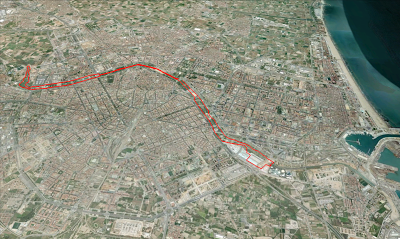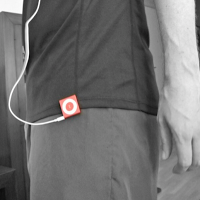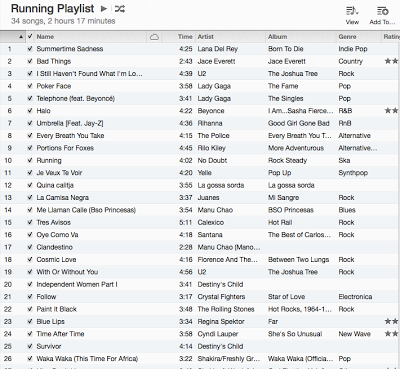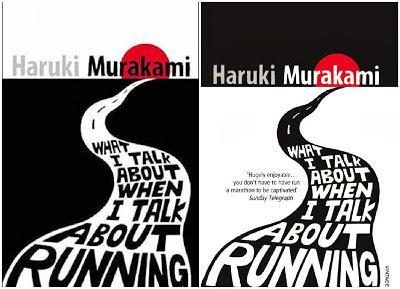Life is not a sprint.
— English aphorism
Yo soy la meta.I once heard Jim Yong Kim, a co-founder of Partners in Health, give a speech about his work in HIV/AIDS activism. He talked about the “3X5 initiative” he helped to spearhead through the WHO to increase the number of HIV patients in Africa receiving treatment by some improbable goal, to 3 million by 2005. Kim noted that everyone criticized him for being too ambitious, for setting an unobtainable goal that would certainly fail, and then make the campaign look bad. In fact, the campaign did fall short of its stated goal, only reaching the goal two years later in 2007. Was this a failure?
— Slogan for Valencia’s
2013 Half Marathon
Kim argued no. And what he argued in that speech has stuck with me ever since. Kim said that, had they aimed for a lower goal, they would have hit lower. The ambitious goal is what motivated them, and it is not a failure if you set out to aim high, and, while not achieving that goal, you still reach higher than you ever have before. I lump this into what I think of as a philosophy of “hope without optimism” – believing in something cannot hurt you, can only help you, so long as you don’t come to expect it. It’s a delicate balance. But this is why I think it is okay to set goals that you don’t end up achieving, if setting goals helps you to improve yourself and develop yourself further.

I lived in Boston for five years, and had a ritual of watching the Patriot's Day
Boston Marathon on TV. In fact, I'd partly credit watching the marathon runners
for inspiring me to take up distance running in the first place.
Which was why the bombing this year was hard to follow.
Boston, Stay Strong and Keep Running!
Okay, what does all of this have to do with running, you might be asking. Well last year I set two personal goals: 1) to run, on average, every other day (for a total of 183 runs in the year), and 2) to run a marathon. I didn’t accomplish either of them. But along the way I think I accomplished so much more. I ran 166 times in 2013, for an estimated total of 750 kilometers, more than I have ever run before in a calendar year. (Particularly impressive given that I had two full months “out of commission”, when I didn’t run due to traveling.) And in October I finished a half marathon, the first time I have ever run one. Let me tell you, now that I’ve run a half marathon, I’m more than proud that I’ve run a half marathon, even falling short of a full one. (I could not agree more with this runner, who argues that the half marathon should be named something else, so that people stop thinking of it as anything less than an achievement in its own right… what would you call it?) Running has been a much needed reboot; not just a way to let off steam, but something to work towards, to advance, that is not high stakes but instead a simple pleasure.

On the day of the big race!

It's good to have role models, and I'm a huge fan of
Kara Goucher. She regularly runs the Boston Marathon,
and is pretty nice in her interviews... Okay, okay,
she is also just pretty, which is not common among
long distance runners.
I never thought of myself as “a runner” before… It’s not like I love the feeling of running. I suspect many, if not most runners also feel miserable while they do it. (We’re a bunch of masochists!) I’ve certainly never been a “natural runner”, quite the contrary. I’m big, bulky and top-heavy. But what I like about running long distances (what I also love about swimming long distance, but running is much more convenient), is the time it gives you for contemplation… I’m not talking thinking. Hell no!, am I able to hold a coherent thought while my body is complaining about what my mind is forcing it to do. I’m talking about the sense of interiority, the flashes of thoughts and associations, the odd realizations… the “being there” that ubiquitous computing and constant connectivity tends to kill. (If you think such a love affair with disconnecting is new, just reread Thoreau’s Walden, or any other “pastoral” ideal.) What I’ve lacked in running legs, I’ve always more than made up for with my head. (Long distance anything is always a mental game, after all.) I'm a pro at tuning out, and thus ignoring the aches and pains.

For me, a big personal accomplishment this year was completing the Rio Turia
loop of 16 kilometers on May 8th. It wasn't a race, but it was an amazing way
to experience this gem of Valencian parks.
I’m sharing all this with you because it is a brand new year and I know many of you, especially you Americans, will be making New Year’s resolutions… This is my way of saying, “Go for it!” Often the effort to attempt a goal can be almost as rewarding as the goal itself. Or, as long as we’re slinging a bunch of aphorisms around here: the journey is the destination. So go ahead, set that wild goal for 2014. And who cares if you do or don’t achieve it, so long as you have fun trying!
Random digression: I'm always telling my EFL students that there is no good direct translation for the English word "challenge" (which can be "reto" or "dificultad" depending on context), a word that is loaded with peculiarly Anglosaxon cultural significances of self-improvement and aspirational living (think "Protestant ethic").
Here you can see the video of the minute when I crossed the finish lineat the Valencia Half Marathon in October. You'll recognize me as theonly person too tired to celebrate the moment.For those of you who’ve chosen running as one of your resolutions, let me offer you some tips I’ve picked up along the way.
1) Buy good equipment, and by good I don’t just mean practical, I also mean equipment that you look good in. If you don’t feel attractive while you’re running, you’re not going to be as motivated to do it.
2) Set a running challenge to train for. This doesn’t have to be a race. My wife loves races. She loves the way they’re social events, the camaraderie, the opportunity to see a city from the avenues without the cars. And the sense of accomplishment of finishing them. But I, personally, found it just as rewarding to run the full 16km loop of the Rio Turia park back in May, when there was no other equal distance, meaningful race to challenge me that season. If you can pick a decent challenge, then you can find a workout routine to follow, which means you have a schedule and some external markers by which to measure your progress.
3) Subscribe to some online runner’s news source: I subscribed through Facebook to Runner’s World and Valencia Runner, which are great because they’re constantly sharing news and tips about running in my feed, which is both useful but also motivating. We are social creatures, and it is easier to be excited about something if we surround ourselves (virtually or not) with others who are excited about it.
4) Invest in helpful distractions, namely an MP3 player. I bought the ipod shuffle, and I have to tell you that having music to listen to while I run completely transforms otherwise painful, monotonous runs. It was worth every cent I paid for it! I have friends who uses the Nike chip to monitor her runs. This kind of external measure probably also works for keeping at it during a tough run.
5) This was my brother’s excellent tip to me, don’t be afraid to skip the short runs, if you’re not feeling up to it. You don’t want to start thinking of running as a chore. Some days your heart is not into it, and that is okay. So long as you can stick to running the weekly long runs, skipping the shorter ones throughout the week is no big deal.
6) What ever floats your boat, do it. I have friends who measure their heart rate while they run, and swear that it improves it. I’m skeptical, but I also respect that, for them, it might really work. There is also the long-haul trucker’s trick: pick another runner at your pace, and stay with them, or slowly try to pass them. I confess, sometimes when I’m dying from a long, hot run, I simply check out other runners (sorry ladies!) and that stupid distraction reminds me that I’m still able to ignore the pain and power through it. Or I think of the Boston Marathon runners, and think, “What’s another 100 more meters by comparison?” (I use a similar psychological trick, when I listen to certain songs, like “Me llaman calle” and “Clandestino”, about more serious kinds of suffering, which make my pain pale in comparison.) Everyone has their own tricks for keeping at it, most regular runners have dozens of them. You’ve got to use what you’ve got!

Essential long distance running
equipment, an mp3 player.

Instagramers comment regularly on my account about how lucky I am to have this splendid
backdrop for my running. All I can say is that I agree, and I do my best not only
to appreciate it, but to take as full advantage of it every (other) day.

My iPod playlist. I owe a lot to these songs, which have been excellent
for keeping up the pace while I run, all of them in different ways!
Returning to the question of goals, and making and breaking them. What people often don’t understand is that running the marathon the day of is not, in fact, the most difficult aspect of preparing for a marathon. (Okay, I’m not speaking from direct experience here, but supposition… what I’m saying is at least true for me and the half marathon.) It takes months and months of training (minimum four months), hours and hours of time invested in it weekly (some long runs might take you 2-3 hours!), before you are in condition to run a marathon. (Believe, simply getting into gear and out the door every day is more than half the challenge. There are always dozens of reasons not to run, and fewer to do it.) By the time you arrive there, if you’ve trained well, the marathon is a capstone for that hard work. You keep running it because you know how much you’ve already invested in it. (This also why the friends and family of marathon runners are so supportive; they’ve had to live firsthand all that time invested in it, and seen the daily toil.) The 42+ kilometers of a marathon are a mere fraction at the end of hundreds, perhaps thousands of kilometers you ran to get there.

Running a marathon, the new sign of a mid-life crisis?
I saw this tweet a while back and thought it was hilarious.
I’ve been reading Murakami’s book, What I Talk About When I Talk About Running. (I know, it’s a bit unconventional to bring this up at the end of a story, but what good is blogging if one can’t enjoy unconventional narrative?) It is an excellent read for those of you getting into running! (I confess I’m reading it at a slow, leisurely pace… not racing to the end, so to speak.) In it he opens by notes, paraphrasing Somerset Maugham, that, “No matter how mundane some action might appear, keep at it long enough and it becomes a contemplative, even meditative act.” I.e. it becomes a kind of philosophy. I relate to Murakami’s philosophy of running for a variety of reasons. He is humble about running. So many serious runners turn it into a pissing contest kind of hubris, as if their motivation is to merely be better than others. Murakami, on the other hand, describes his running as a constant struggle. He dispels the mystique that runners somehow never have doubts about running, or lazy days. (This from a man who runs an average of 36 miles a week!) However, he also says that running is not merely about “willpower”, something with which I agree up to a point. There has to be something about running that suits you, to keep at it. Other interesting observations he makes that I can relate to – he describes his thoughts while running as a “void”. Our minds, so he writes, can’t become a complete blank, so running creates the distracting space in which we cannot think and thereby better notice thoughts or impressions in isolation.

Possible title for a sequel: "Zen and the Art of Marathon Running".
But most significantly Murakami explores running as “both exercise and a metaphor”, and the following passage nicely illustrates the metaphor:
I’m no great runner […] But that’s not the point. The point is whether or not I improved over yesterday. In long-distance running the only opponent you have to beat is yourself.I hope I don’t have to spell it out for you here too much, but this is also true in life. If you spend too much time comparing yourself to others, you’ll forget that you’re the only one who can live your life. That, I suppose, is the philosophy I am trying to share with you here about setting goals for the new year. Life is not a sprint, and you are the finish line. And to bring back in my opening point, we are all unfinished products, and that is okay. Even better than okay, that is what makes us who we are.

In 2013 you could have followed my running progress on Instagram,
since I made it a personal thing to post a picture with every run.
I'm not sure I'll bother to do that in 2014. Gotta focus on the running!
